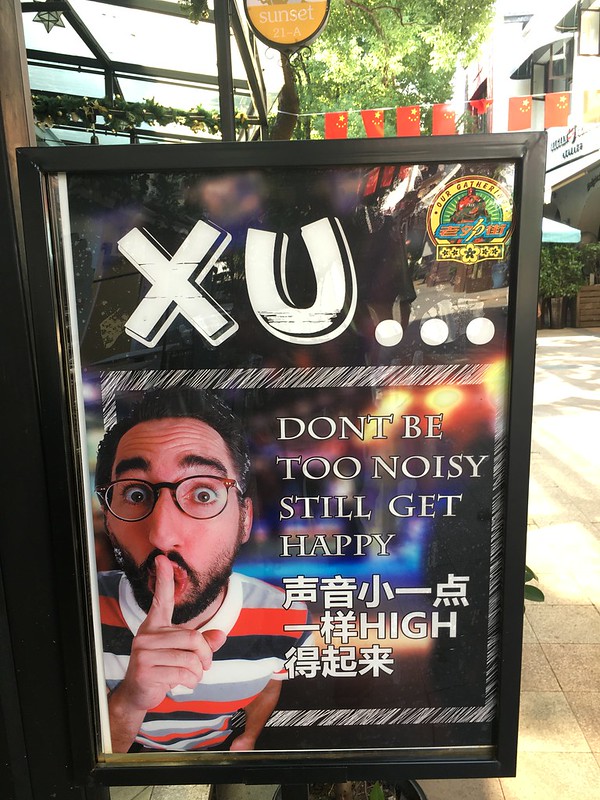XU! (you can be high and quiet)
Spotted this sign on 老外街 (“Laowai Street”) on Hongmei Road (虹梅路).
First of all, “xu” in pinyin is how you spell the word for “SHHH” (the “shushing” sound) in Chinese. It even has a character: 嘘.
Second, the translation “don’t be too noisy still get happy” is understandable, I guess, but let’s look at the original Chinese:
声音小一点
一样HIGH
得起来
So 声音小一点 refers to one’s voice being a little quieter. The “if” part and the “you” subject are implied.
The 一样 means “the same,” but here it’s more naturally translated as “equally” or “just as.”
The “HIGH” in Chinese is not (usually) some kind of drug-induced state, but rather the “natural high” of just getting all excited and having a blast. There could be some drinking involved (think karaoke), but the emphasis is on the fun had.
The interesting thing here is that the word “HIGH” in Chinese is translated as “happy” in the English version. In fact, a co-worker of mine told me that she used to assume that the Chinese word “high” (sometimes written as “嗨“) was derived from the English word “happy” (a direct translation of 开心), rather than the English word “high.” (Who knows!)
And finally, the 起来 is the “expressing initiation” direction complement form. It has a 得 before it to turn the –起来 direction complement into a potential complement. In effect, “have fun” becomes “can have fun.”
I’d use this translation:
Being a little quieter,
you can still have
just as much fun.
Not as much fun, though, right? (XU!)
Nov. 13, 2017 Update: a friend wanted more explanation of the complement thing, so here it is, copied over from Facebook comments:
Question: The example in the Chinese Grammar Wiki makes sense: 早上 五点 出发 , 孩子们 起 得 来 吗 ?… but that is 起得来 not 起起来!
Answer: In that example, 起 is a verb, and 来 is the direction complement. You insert 得 between the two to make it into a potential complement, adding the meaning of “can.” 起得来 = can get up.
The same is true for HIGH, only the complement is 起来 (in this case, 起 is not the verb). So that’s how you get HIGH得起来. (This one is harder to translate literally, though… “can get high” would be literal, but misleading (no drugs!).) “Can have a blast” is closer to the meaning, but you lose more of the V+起来 literal translation. “Can get happy” maybe, if you don’t mind a little Chinglish!)
In the blog entry, I linked to one grammar point on uses of 起来, and another on potential complements. It’s the combination of the two that you need to understand to fully get this. It’s a little tricky!


There’s actually a “Laowai Street” in China?! Why is it called that? And you’d think that on a street named after foreigners (possibly English-speaking), they’d have more accurate translations of their signs…
Yep! It’s been around for a while… There may have been a little initial “outrage” on the part of foreigners who resent the label “laowai,” but it seemed to die down when the foreigners realized they got another officially-sanctioned bar street. Seems less popular these days, though, and I hear it may eventually get torn down.
[…] pun “HIGH啤“ which sounds like “happy” and uses the word “high” in the Chinese way to mean “excited and happy” plus the character 啤 from […]